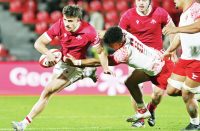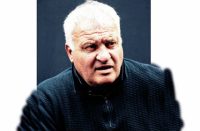 He blazed across the skies of the rugby globe like a meteor, a trans-global journey of fairytale dimension from Cardiff to Auckland.
He blazed across the skies of the rugby globe like a meteor, a trans-global journey of fairytale dimension from Cardiff to Auckland.
Lloyd Burns’ magical carpet ride from one hemisphere to the end of the other lasted 20 weeks, from the first Saturday of June last year to the middle of autumn.
It began with the Panteg bricklayer winning his Wales cap at the Millennium Stadium and ended on October 21 in the bronze medal decider of the World Cup at Eden Park in New Zealand.
After years of honest toil before winning a belated professional contract with the Newport Gwent Dragons at the age of 25, Burns had transformed his life, from the building site to a place among the cast for the biggest rugby show on Earth.
That he had got there the hard way made him appreciate it all the more.
For his team-mates, the ice chambers in Poland which Wales frequented before and after the World Cup meant numbing exposure to a deep-freezer. For Burns, it was a slightly colder reminder of what his previous working life had been like laying bricks on a frozen construction site.
The newly-capped hooker played at Twickenham one week and helped Wales beat England at home the next. He appeared in the World Cup pool matches against Namibia, Samoa and Fiji, sat on the bench throughout the traumatic semi-final against France in Auckland and was back in action there a few days later for the third-place decider against Australia.
Lloyd was living the dream. Like every other member of the squad, he returned from New Zealand a hero and, after a suitable break, resumed normal service with the Dragons.
When a neck injury during the match against the Scarlets on December 30 ruled him out of contention for the Six Nations, nobody had any idea then that Burns would never play again. After a series of tests, he travelled with his wife Rachael to Cardiff during the first week of April to keep an
appointment at the University of Wales hospital.
The dream was about to turn into a nightmare. Only now has the man himself agreed to talk about it publicly and grant the first interview to The Rugby Paper.
“I suspected it was something serious as soon as I was told that the specialist wanted to see me,” he said. “You try to prepare yourself for the worst but nothing in the world could have prepared me for what I was about to be told, that I had a heart condition.
“The consultant said that there was a risk if I carried on playing and it was one which he thought was not worth taking. Very reluctantly, I agreed. It came as a massive, massive shock. I was quite emotional as you can imagine.
“I’d been in hospital for five days in January because of the neck problem. I had scans and stuff and then they said I had ruptured an artery. They told me to take three months off.
“So much has happened to me in such a short time that sometimes it’s hard to take it all in. People talk about being on an emotional roller-coaster but I doubt if any has been as emotional as the one I’ve been on.
“I got my cap and I played at the World Cup with a team which very nearly got to the final. And then I was told I could never play again, all within the space of 12 months. Believe me, it’s been tough to say the least.
“I’m proud of what I’ve done. It’s just a shame that it was so short-lived. Being a professional rugby player was something I’d worked so hard for that it seemed very unfair to have it taken away from me after two years.
“I’m very grateful to have had the opportunity. No-one can ever take away from what I’ve achieved but it’s very difficult to get my head round the fact that it’s all over so soon.
“Throughout the time I was playing as a part-timer for Cross Keys, I kept hoping that one day someone would notice me and think I was good enough to be a full-time professional. Thankfully, I got noticed eventually and joined the Dragons.
“After working for a living, it was a bit of a breeze to be honest. It was certainly a lot easier than working from seven in the morning until five in the afternoon and then training for two hours at night.
“I wanted to hold onto my life as a professional rugby player for as long as I could. When Wales gave me a chance at the end of last season, I always believed that I would improve quickly enough to get to the World Cup.
“Everyone said that we were stuck in the ‘Pool of Death’ and that it would be very tough to get out of it and into the knock-out stage.
“I was on the bench for the semi-final against France and I thought we were the better side, even with 14 men.
“To have gone that far and just missed out on the final was very disappointing. We were all proud of our efforts and we all thought, naturally enough, that we’d get another crack at it in four years’ time.”
At 27, an age when he would reasonably expect to be in his prime, Burns is in the process of deciding what he does next.
For the time being, he is busy looking after his baby son, Oscar, born just a week or so after the Cardiff hospital appointment.
“I have my hands full with the baby and that helps take my mind off rugby,” he said. “It’s always there nagging away at the back of my mind…”
And the heart condition? “I’m not on medication and there shouldn’t be a problem,’ he said.
“At sometime in the future, I am going to have an operation of some sort. When, I’m not sure.”
One Comment
Leave a Comment
You must be logged in to post a comment.























Pingback: รับทำ SEO สายขาว